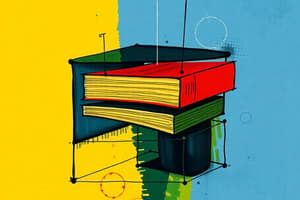Podcast
Questions and Answers
Which of the following identifies a key characteristic of poetry?
Which of the following identifies a key characteristic of poetry?
- It is structured without the use of rhythm or imagery.
- It is primarily focused on expressing emotions. (correct)
- It consists of logical organization and complete sentences.
- It is exclusively written in prose form.
Which type of literature is primarily based on the writer's imagination?
Which type of literature is primarily based on the writer's imagination?
- Biography
- Non-fiction
- Creative nonfiction
- Fiction (correct)
What distinguishes narrative poetry from lyric poetry?
What distinguishes narrative poetry from lyric poetry?
- Narrative poetry focuses on expressing personal feelings.
- Narrative poetry does not include character development.
- Lyric poetry tells a story through dramatic elements.
- Narrative poetry incorporates narrative elements like characters and conflict. (correct)
Which literary device is commonly used in literature to enhance meaning?
Which literary device is commonly used in literature to enhance meaning?
What are the common elements of a story?
What are the common elements of a story?
Which literary genre is NOT mentioned as a type of fiction?
Which literary genre is NOT mentioned as a type of fiction?
What is the primary purpose of reading literature?
What is the primary purpose of reading literature?
How can literature cross boundaries according to its definition?
How can literature cross boundaries according to its definition?
Which of the following is a common characteristic of poetry?
Which of the following is a common characteristic of poetry?
What does prose primarily rely on in its structure?
What does prose primarily rely on in its structure?
What distinguishes biography from autobiography?
What distinguishes biography from autobiography?
In what form does dramatic poetry primarily convey its message?
In what form does dramatic poetry primarily convey its message?
In what context is literature considered 'pleasure reading'?
In what context is literature considered 'pleasure reading'?
Which of the following best summarizes the essence of literature?
Which of the following best summarizes the essence of literature?
Which element is NOT specifically identified as part of plot structure?
Which element is NOT specifically identified as part of plot structure?
Which function of literature primarily focuses on conveying human emotions and experiences?
Which function of literature primarily focuses on conveying human emotions and experiences?
Flashcards
What is literature?
What is literature?
A body of written works, traditionally focused on imaginative and creative works of poetry and prose. It can be classified by language, origin, period, genre, and subject matter.
What is a literary text?
What is a literary text?
The products of written literature, containing elements of psychological characterization, chronology, and literary devices like metaphors and symbolism.
What is literary structure?
What is literary structure?
The organizational method used in literature, often in narrative form. It includes elements such as genre, style, and literary trends.
What is poetry?
What is poetry?
Signup and view all the flashcards
What is narrative poetry?
What is narrative poetry?
Signup and view all the flashcards
What is dramatic poetry?
What is dramatic poetry?
Signup and view all the flashcards
What is lyric poetry?
What is lyric poetry?
Signup and view all the flashcards
What is prose?
What is prose?
Signup and view all the flashcards
Fiction
Fiction
Signup and view all the flashcards
Nonfiction
Nonfiction
Signup and view all the flashcards
Plot
Plot
Signup and view all the flashcards
Setting
Setting
Signup and view all the flashcards
Character
Character
Signup and view all the flashcards
Theme
Theme
Signup and view all the flashcards
Point of View
Point of View
Signup and view all the flashcards
Conflict
Conflict
Signup and view all the flashcards
Study Notes
Defining Literature
- Literature is derived from the Latin word "littera," meaning "a letter of the alphabet."
- Literature is a body of written works, including poetry and prose.
- It can be classified based on various factors like language, national origin, historical period, genre, and subject matter.
- Literature exists in both oral and written forms.
Characteristics of Literary Texts
- A literary text narrates a story.
- It expresses feelings, thoughts, and ideas, potentially drawn from the author's imagination or real-life experiences.
- It delivers significant information and crosses boundaries of time, places, cultures, and languages.
Literary Structure
- It refers to the organizational method in literature, with the narrative being the most common type.
- It encompasses general features and characteristics of genres, styles, literary trends, literature as an art form, and art itself.
- It involves arranging elements like purpose, style, and genre to effectively convey the intended meaning to the audience.
Two Major Forms of Literature
Poetry
- Typically written in lines.
- Includes elements of rhythm, sound, imagery, and form.
- Its main purpose is to express feelings, thoughts, and ideas.
Prose
- This form applies natural speech and grammar structures, mainly using complete sentences logically sequenced in paragraph form.
- It can be divided into fiction and non-fiction.
Fiction
- The product of a writer's imagination and creative thinking.
- Characters react to conflict and various issues central to the literary work's main idea.
- Common genres include short stories, novels, and novellas (different genres such as crime, fantasy, romance, science fiction, western, inspirational, historical fiction, and horror).
Non-fiction
- Stories inspired by real events.
- Writers aim to present, interpret, or describe experiences based on facts, including judgments, opinions, and commentaries.
- Common forms include essays, journals, diaries, feature articles, and editorials.
Components of Literary Analysis
- Literature can be analyzed based on various components like literary technique, tone, content, and length.
- The most general literary genres include epic, tragedy, comedy, and creative nonfiction.
- Genres like satire, allegory, or pastoral might appear in various forms and as blends of other genres.
- Specific, identifiable characteristics of a literary work are necessary for a valid textual analysis.
Elements of a Story
- Setting, character, conflict, theme, point of view, and plot are critical elements of a story.
- Plot has elements like exposition, rising action, climax, falling action, and resolution or denouement.
- In poetry, the key elements are structure, imagery, rhythm, and sound.
Literary Period/Movement
- Periods or movements in literature feature unique traits and characteristics.
- These define generations and historical periods.
- They include interconnectedness and coherence beyond shared geography or grouping.
Studying That Suits You
Use AI to generate personalized quizzes and flashcards to suit your learning preferences.




